Hong Kong's Young and Old Are Split Over Who is to Blame
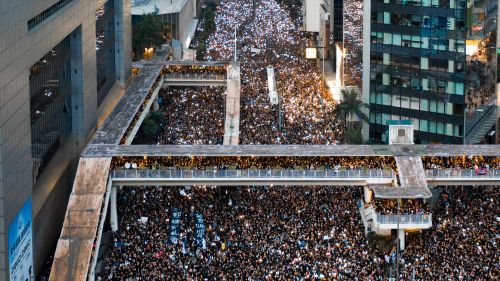
A recent survey among Hong Kong residents shows that they're dissatisfied with the actions of the police and support an independent investigation into the protest's origins and potential police abuse.
Hong Kong
Mass demonstrations in Hong Kong over a proposed bill that would allow Hong Kong authorities to extradite those accused of crimes to mainland China have escalated to violence since they first began in March. Protesters and critics fear that such legislation would erode Hong Kong’s autonomy from Beijing and the Chinese Communist Party (CCP) which was established when Britain transferred control of the region to mainland China in 1997. Despite the proclamation from Hong Kong’s Chief Executive, Carrie Lam, that the proposed bill “is dead," the protests continue.
A survey conducted by the Hong Kong Public Opinion Program (HKPOP) in early August among Hong Kong residents show that Hongkongers are dissatisfied with the actions of the police, think that they used excessive force against protesters, and support an independent investigation into the protest’s origins and potential police abuse. Additionally, a majority of respondents say that the government bears most of the responsibility for the ongoing conflict. However, there are large differences between the opinions among various age groups and levels of educational attainment.
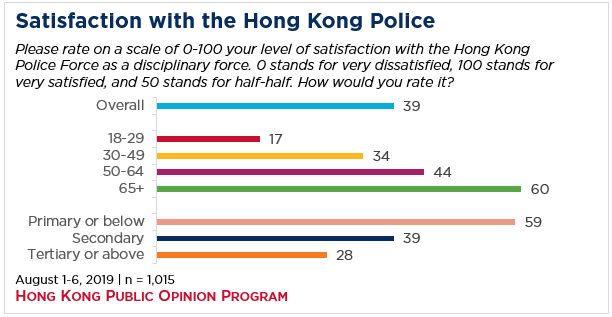
Asked to rate their satisfaction with the police as a disciplinary force, the overall public rated it a 39 out of 100. Those who are in the youngest age bracket, aged 18 to 29, rated their satisfaction with the police as a low as 17 out of 100 (see figure above). In contrast, those aged 65 or above gave the police a 60 out of 100, a 43-point difference between the two groups. Satisfaction with the police has declined since November 2018, with means dropping 35 points for the 18-29 group and 11 points for the 65+ group. In terms of educational attainment, those who completed a primary education or below are much more likely to be satisfied with the police: they rated their satisfaction with the police a 59 out of 100. Those with a higher education degree (tertiary) were much less satisfied with the police, rating them a 28 out of 100.
According to the UNESCO Institute for Statistics, the population of Hong Kong is highly educated with 23 percent of those over the age of 25 having a bachelor’s degree or its equivalent. Moreover, the share of people with this level of education has been increasing steadily since 1971 when only 3% of people had the same level of education.
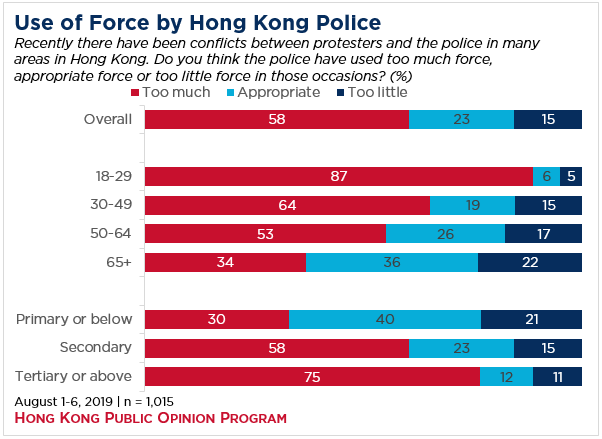
Similar divisions by age and education also appear in responses about the use of force by police. The Hong Kong public responded overall that the police have used too much force in combatting the protests (58%). Looking at age group, nearly nine in ten (87%) of 18- to 29-year-olds say that the police have used too much force against protesters (see figure above), compared with 34 percent of Hongkongers 65 or older. In fact, about even amounts of the oldest group says that the police used an appropriate amount of force (36%) and too much force (34%). Similarly, a plurality of those with a primary education or below said that the police’s use of force was appropriate whereas a majority of those with a tertiary education or higher say the police have used too much force. (See figure above for full numbers.)
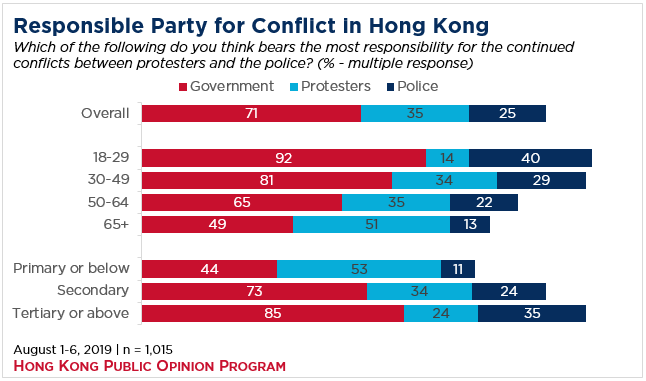
When it comes to who bears responsibility for the events in Hong Kong, the public overwhelmingly blames the government (71%) rather than the protesters (35%) or the police (25%). The 18-29 cohort and those with a tertiary education say that the government is most responsible. A sizable minority among both groups also say the police bears responsibility with (40 percent of the 18-29 group and 35 percent of the tertiary group). Again, the responses of older are similar to the less-well-educated Hongkongers, with majorities of both groups blaming protesters for the continued conflicts. (See figure above for full numbers.)
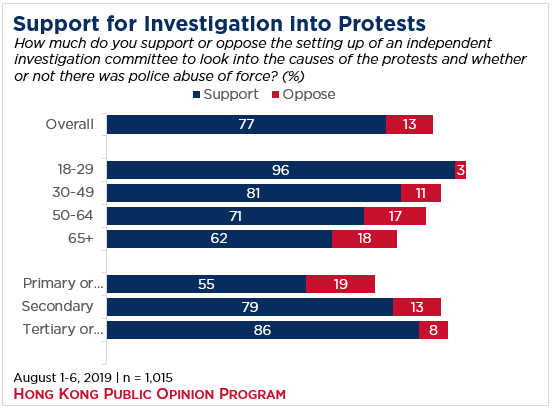
Finally, asked whether they support or oppose an independent investigation into the causes of the protest and potential abuse of force—now one of the five stated demands of protesters—a majority overall and of all subgroups respond that they support such an investigation.
Conclusion
Activists in Hong Kong continue to call for Carrie Lam’s resignation, while Beijing has signaled that it may intervene with force. Despite China’s “one country, two systems” policy toward Hong Kong, officials from Beijing have warned protesters “not to wrongly judge the situation and take restraint for weakness.” While the international community has called for calm, the demonstrations—and accompanying violence—continue to this day. The results of this survey illustrate a feeling of anger and a desire for accountability among all Hongkongers, although the differences among age groups and education levels suggest a gulf between the young and the old, as well as the educated and the uneducated.
The age divide suggests changing norms in regard to ideology, with younger generations more critical of government control and police authority. Similarly, the disparity in the opinions of those educated and lesser-educated people is perhaps a demonstration of the effect of education on ideology. Those with a college education or higher are more critical of the control that Beijing seeks to impose upon Hong Kong; perhaps they are more cognizant of the implications of increased CCP power in the region. In all, it does not appear that the conflict in Hong Kong will quietly fade any time soon.

